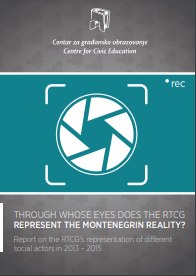Through whose eyes does the RTCG represent the Montenegrin reality? - Report on the RTCG’s representation of different social actors in 2013 - 2015
Through whose eyes does the rtcg represent the Montenegrin reality? - Report on the RTCG’s representation of different social actors in 2013 - 2015
Author(s): Damir Nikočević
Contributor(s): Daliborka Uljarević (Editor)
Subject(s): Politics, Media studies, Communication studies, Politics and society
Published by: Centar za građansko obrazovanje (CGO)
Keywords: Montenegro; media; RTCG; reality representation; social actors; 2013-2015;
Summary/Abstract: The project “Through whose eyes does the RTCG represent the Montenegrin reality?” was designed within the sub-programme Media and democracy of the Centre for Civic Education (CCE) in order to raise awareness about the role of a public broadcaster and promote one of its most important tenets – objective and balanced reporting. To that end, this analysis offers an overview of the appearances of representatives of political parties, public institutions and state administration bodies, unions, businesses, non-governmental organisations and academic community, in the news and analysis programmes of the RTCG. The timeframe adds further value to this analysis, as it focuses on the years following the changes in the editorial structure of the RTCG and ahead of the upcoming 2016 parliamentary elections: a period in which the public broadcaster RTCG has an even greater responsibility to provide information to the public in a professional manner. Declaration on freedom of expression and information of the Committee of Ministers of the Council of Europe binds its member states, including Montenegro, to foster plurality of opinion: “…states have the duty to guard against infringements of the freedom of expression and information and should adopt policies designed to foster as much as possible a variety of media and a plurality of information sources, thereby allowing a plurality of ideas and opinion.” The RTCG has been undergoing a transformation for over a decade, but the limitations of this transformation are apparent not only from the general public opinion in Montenegro, but also from the assessment of the Council of RTCG, which stated in its Conclusions of November 2015: “It was noted that the reporting on some events in the news programme was not balanced and objective, particularly with regard to the latest political developments in Montenegro, i.e. the protests of DF”. It added that: “RTCG, as the public broadcaster, must edit and broadcast its news programme in an impartial manner, and avoid polarizing reporting that would violate the citizens’ rights as guaranteed by the law and international media standards. Every deviation from the planned business policy and journalists’ code of conduct must be sanctioned without prejudice to the position of the perpetrator in the company hierarchy, and we advise the general director to urgently take the necessary measures to prevent such omissions in the future”. Representative of the non-governmental organisations in the Council of RTCG Goran Đurović, who has often publically criticised the work of RTCG, recently said: “What I know for sure is that the director of TVCG, since her appointment, had been obstructing the transformation of RTCG into a public service by doing nothing to incorporate the law, professional principles and standards into its reporting. Along with her colleagues the former editor of the first channel, the current editor of the news programme and the head of the board, she devotedly sought to protect the ruling political party and withhold the information of public interest from the citizens. The result of such practices are numerous complaints by viewers and negative assessment of the citizens, as evidenced by the January public opinion poll”. Eplaining the results of the opinion poll conducted in January 2016, Đurović stressed that: RTCG is the second most trusted broadcaster, and the number of respondents who associate RTCG with “regime-run media” has increased.” He also warned that the number of respondents in whose opinion the news programme of RTCG deteriorated since last year. In the analysis of balancing and plurality of opinion at RTCG, CCE used official documents, adopted by the Council of RTCG according to the competencies granted to it by the Law on public broadcasting services of Montenegro. The administrative service of the Council of RTCG, headed by the president of the Council Vladimir Pavićević, was very forthcoming in responding to our requests for free access to information. Data processing included the analysis of daily and weekly political news programmes, classified by the annual reports of the Council of RTCG as integral part of the news programme of the Television of Montenegro: Dnevnik 2, U centar, Okvir, Otvoreno, Replika, Izazov, Robin Hud, Intervju s povodom. The analysis left out the show Mehanizam, due to its character as a specialized investigative programme, as well as Putevi života, as the majority of its episodes are framed as reports. The final analysis covered 596 shows broadcasted in the course of 2013, 2014, and 2015. The programmes involved 13925 guests – representatives of political parties, public institutions, Government, Parliament, state bodies and institutions, local self-governments, unions, nongovernmental organisations, academic community, independent institutions, judiciary, employers/ businessmen, analysts, experts and others.
Series: CGO - Demokratija
- E-ISBN-13: 978-86-85591-74-7
- Print-ISBN-13: 978-86-85591-74-7
- Page Count: 28
- Publication Year: 2016
- Language: English
- Sample-PDF
- Table of Content
- Introduction
- eBook-PDF

